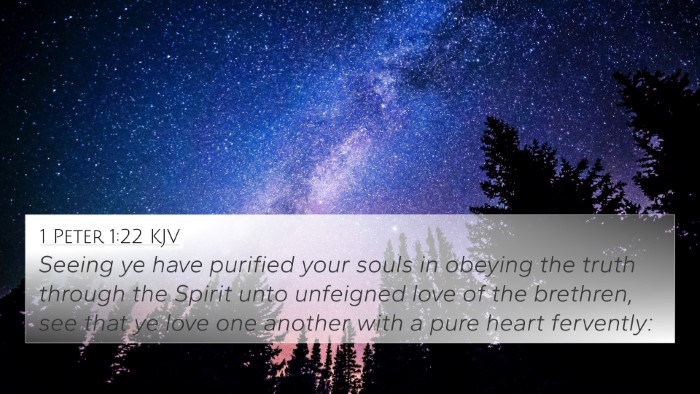Understanding Hebrews 13:1
Verse: "Let brotherly love continue." - Hebrews 13:1
Overview
The epistle to the Hebrews concludes with practical instructions for Christian living, emphasizing love and community among believers. This brief yet profound exhortation encapsulates themes present throughout the New Testament and serves as an important reminder of the relational aspect of faith.
Verse Meaning
Hebrews 13:1 presents a direct command: "Let brotherly love continue." This statement is rich in theological significance and practical application:
- Brotherly Love: This term is derived from the Greek word "philadelphia," which indicates a familial type of love that should characterize the relationships within the Christian community.
- Perpetuity of Love: By using the word "continue," the author stresses the ongoing nature of this love. It implies that love is not merely an emotion but an action that must be consistently practiced among believers.
- Contextual Significance: Positioned at the end of the letter, this exhortation reminds Christians that love is the cornerstone of their witness to the world.
Commentary Insights
Insights from notable public domain commentaries provide a deeper understanding of this verse:
Matthew Henry
Henry emphasizes that love among brethren is fundamental to the Christian faith. He notes that unchecked personal grievances can undermine this love, and thus believers must continually strive to cultivate harmony and support within their community.
Albert Barnes
Barnes highlights that the love mentioned in this verse should extend beyond mere feelings—it calls for actions that demonstrate care, encouragement, and assistance to one another, essential for nurturing a healthy church environment.
Adam Clarke
Clarke further elaborates that the command to let brotherly love continue is not just an isolated instruction but reflects the ongoing love that Christ has for His church, which believers are called to mirror in their interactions.
Related Cross-References
This verse can be cross-referenced with several others to highlight the broader biblical context of brotherly love:
- Romans 13:10: "Love does no harm to a neighbor; therefore love is the fulfillment of the law."
- 1 Peter 1:22: "Since you have purified your souls in obeying the truth through the Spirit in sincere love of the brethren, love one another fervently with a pure heart."
- 1 John 4:7: "Beloved, let us love one another, for love is of God; and everyone who loves is born of God and knows God."
- John 13:34-35: "A new commandment I give to you, that you love one another; as I have loved you, that you also love one another. By this all will know that you are My disciples, if you have love for one another."
- Galatians 5:13: "For you, brethren, have been called to liberty; only do not use liberty as an opportunity for the flesh, but through love serve one another."
- Colossians 3:14: "But above all these things put on love, which is the bond of perfection."
- 1 Thessalonians 4:9: "But concerning brotherly love, you have no need that I should write to you, for you yourselves are taught by God to love one another."
Thematic Connections
The theme of brotherly love is woven throughout the New Testament, promoting harmony, unity, and mutual support among believers:
- Connection with Old Testament: Leviticus 19:18 encourages love for one’s neighbor, indicating that love for others is a long-standing commandment.
- Unity in Diversity: Ephesians 4:1-3 speaks of maintaining unity through the bond of peace, reflecting the communal aspect of brotherly affection.
- Support in Trials: Hebrews 10:24-25 encourages believers to stir one another up to love and good works, highlighting the practical outworking of brotherly love.
Conclusion
Hebrews 13:1 serves as a powerful reminder that love is foundational to the Christian faith. Through the insights of various commentaries and the connections drawn with other Scripture, it is evident that maintaining brotherly love is not merely a suggestion but a command that reflects the very nature of God. As believers, we are called to actively express this love in our communities, demonstrating the light of Christ to the world.
Resources for Further Study
For those interested in exploring the rich networks of biblical texts, the following tools may be of use:
- Bible concordance
- Bible cross-reference guide
- Cross-reference Bible study methods
- Comprehensive Bible cross-reference materials
Engagement with Biblical Texts
Engaging in cross-referencing biblical texts enhances understanding and brings to light the interconnectedness of Scripture. Methods such as thematic Bible verse connections or comparative studies can provide deeper insights into specific passages, enriching personal study and broader teaching.


























